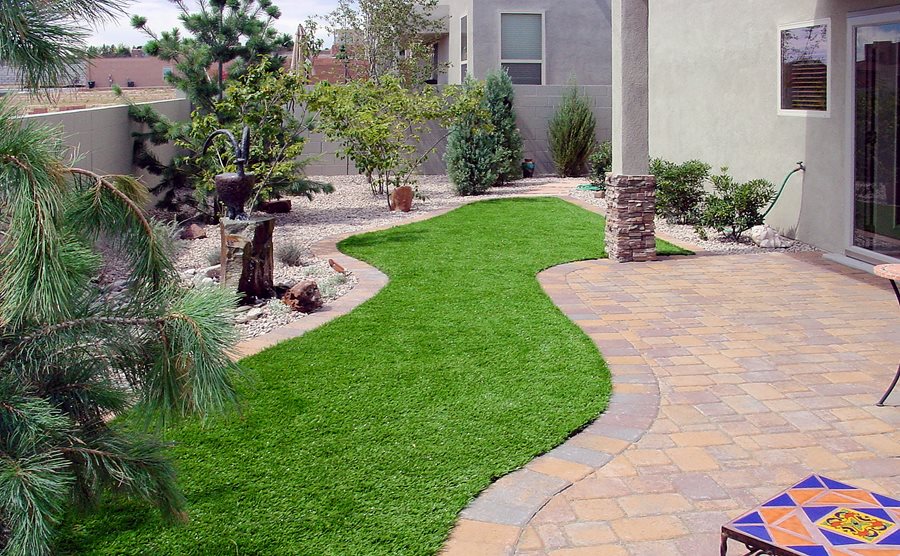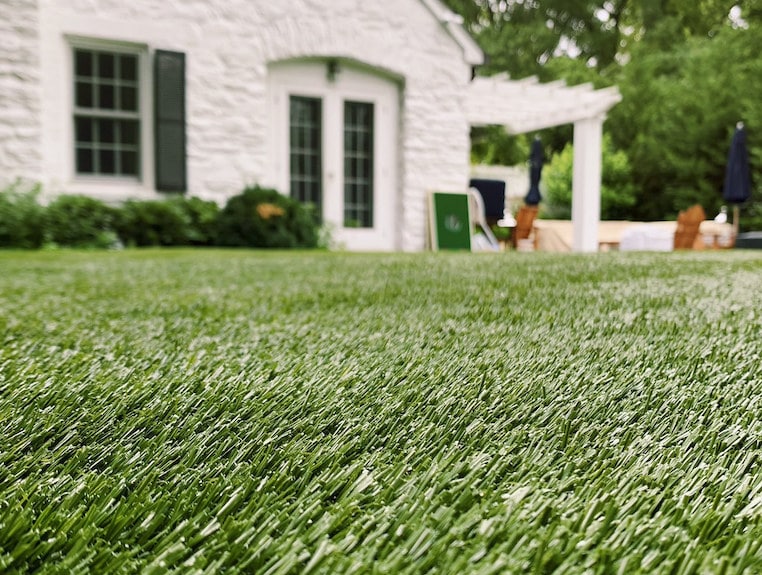Explore the Environmental Perks of Opting for Synthetic Grass Solutions
The fostering of man-made turf options presents a compelling possibility to attend to pressing ecological challenges. By substantially reducing water usage and lessening the application of damaging chemicals, these alternatives not only advertise sustainable landscaping yet likewise safeguard local ecosystems.
Water Preservation Conveniences
Among the most significant advantages of fabricated lawn is its capability to save water. Typical yard yards require significant watering, specifically in areas prone to dry spell or water constraints. On the other hand, artificial lawn does not need watering, dramatically decreasing the general need for water resources. This function is particularly advantageous in dry regions where water scarcity is a pressing worry.
By getting rid of the demand for regular watering, synthetic grass adds to sustainable landscape techniques and assists mitigate the environmental effect of extreme water intake. Additionally, the conservation of water reaches the reduction of overflow, which can cause dirt disintegration and waterway pollution.
In addition, the installment of synthetic grass allows communities and property owners to allocate water resources much more effectively, concentrating on crucial usages such as alcohol consumption water and agriculture. The change in the direction of man-made lawn not only promotes accountable water use yet also lines up with broader environmental objectives aimed at protecting natural resources.
As neighborhoods progressively focus on sustainability, the water conservation benefits of synthetic grass offer a compelling instance for its fostering in residential and business landscaping projects.
Minimized Chemical Usage
The shift to synthetic grass significantly reduces the reliance on chemical treatments frequently used in all-natural lawn maintenance. Typical lawn monitoring commonly includes the application of fertilizers, herbicides, and pesticides to advertise growth and control pests. These chemicals can present threats to human wellness, local wild animals, and the setting, contributing to soil and water contamination.
In comparison, synthetic lawn gets rid of the demand for these damaging substances. When mounted, it requires minimal upkeep, primarily being composed of regular cleansing and seldom infill replenishment. This reduction in chemical usage not just benefits the instant atmosphere but likewise adds to broader eco-friendly security. By lessening the launch of artificial substances into the ecosystem, fabricated grass promotes much healthier soil and water systems.
Furthermore, the lack of chemical drainage related to fabricated turf installments helps safeguard regional waterways from air pollution, supporting marine life and maintaining biodiversity. Arizona turf. As neighborhoods increasingly focus on lasting techniques, selecting synthetic grass provides a practical option that aligns with ecological conservation objectives. Via this change, building proprietors can enjoy lavish eco-friendly spaces without endangering ecological health and wellness, leading the way for a more lasting future
Lower Carbon Impact

Moreover, the installation of synthetic grass can result in substantial water conservation. All-natural grass require substantial quantities of water for irrigation, which not only adds to the carbon footprint connected with water extraction and treatment but likewise stress regional water resources. In contrast, synthetic grass needs minimal maintenance, needing no watering, thereby considerably decreasing water use and its connected power prices.
In addition, the longevity of synthetic grass adds to its lower carbon impact. With a life-span of as much as 15 years or more, the need for frequent replacements is decreased, leading to much less waste and lower energy consumption in production and dealing with traditional turf alternatives. On the whole, synthetic turf offers a sustainable option for environmentally aware landscaping.
Environment Preservation
Habitat preservation is an essential factor to consider in the dispute over landscape design choices, especially when contrasting synthetic grass to natural lawn. All-natural lawn lawns frequently require substantial maintenance, consisting of making use of herbicides, chemicals, and fertilizers, which can adversely impact local ecological communities. These chemicals can seep into the dirt and rivers, hurting indigenous plants and animals and interrupting regional environments.
Synthetic lawn removes the requirement for unsafe chemicals, thereby shielding nearby wildlife and keeping the stability of surrounding ecosystems. The installation of artificial grass can lead to the conversion of former lawn locations right into more biodiverse landscapes, such as pollinator yards or indigenous plant locations, which can support regional wildlife.
Ultimately, the transition to synthetic grass not just conserves water and lowers maintenance initiatives yet additionally cultivates a more harmonious relationship in between human activities and the natural atmosphere, promoting habitat preservation in the procedure.
Long-Term Sustainability
Long-term sustainability is a crucial consider assessing the benefits of man-made grass over standard grass lawns. One of one of the most considerable advantages of man-made turf is its durability; it can last up to 15-20 years with minimal maintenance, whereas natural grass needs frequent reseeding and substitute. This long check these guys out life lowers the requirement for continuous sources, such as water, plant foods, and chemicals, which are necessary for keeping a healthy grass yard.
In addition, synthetic lawn adds to a reduction in carbon exhausts related to lawn treatment equipment. Standard yards frequently require gas-powered mowers, trimmers, and blowers, all of which add to air pollution. Arizona turf. On the other hand, synthetic grass eliminates the need for such equipment, advertising a cleaner setting
Additionally, the production of synthetic grass progressively utilizes recycled products, enhancing its sustainability profile. As makers adopt environment-friendly methods, the environmental footprint of synthetic grass continues Check Out Your URL to diminish.

Final Thought
The adoption of synthetic grass solutions provides substantial environmental benefits, including significant water conservation, reduced reliance on hazardous chemicals, and a lower carbon footprint. In addition, synthetic grass aids in protecting all-natural environments by decreasing land disruption and promoting long-lasting sustainability via the use of resilient products. Collectively, these aspects underscore the possibility of artificial grass to contribute favorably to ecological health and wellness and use a sensible alternative to traditional landscape design practices in an increasingly resource-conscious globe.
In contrast, man-made lawn does not require watering, dramatically reducing the total need for water sources. By lessening the release of synthetic compounds right into the ecosystem, artificial lawn promotes much healthier dirt and water systems.
Furthermore, the installment of artificial lawn can result in considerable water preservation. In contrast, synthetic lawn needs very little maintenance, needing no watering, consequently significantly lowering water usage and its connected energy prices.
